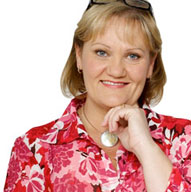When did you first realise that you had a different way of thinking? From drama, I learnt to hone skills other than reading or writing. I learnt to listen to instruction. My drama exams were the first thing I ever passed in my life, and my confidence grew from that. I was 13 at the time. Until then, I very much embraced the fact that I was stupid, because I was told so often that I was before I was even 11.
Dyslexia was a positive in my life. It gave me all sorts of different opportunities. I didn’t see it as a disability. My life purpose is about finding the gift that every child has. I wasn’t interested in the labels they were given.
Being dyslexic it had a profound effect on job opportunities – whether I could even take them. As I got more senior in social services, writing reports would be part of that working world. I wouldn’t apply for jobs unless it came with a personal assistant. I never shared this with my peers. I was terrified. I found systems that would enable me to cope – I would phone my husband and get him to check my spelling. I’d also learnt to memorise blocks of information. If I had to work on whiteboards in front of people, I’d arrive early and write them down before anyone else got there. I still don’t write in public.
My dyslexia meant I learnt other skills – significant is the ability to listen, comprehend from the spoken word and memorise. Most importantly I learnt communication skills. It became my currency, I didn’t have anything else to fall back on. I understand kids with behavioural problems – I understand what it felt like to be excluded. That’s balanced by own belief that having dyslexia is an opportunity, not a disability. Everybody‘s got issues, but it’s what you do with them that is the mark of who and what you are. But being dyslexic makes you look at your own fundamental self worth as a human being. I learnt to disassociate passing exams with your value and significance – there’s more to it than passing an exam.
Accept your limitations. Some people can paint brilliant pictures, some people can spell. Go and find where words can come to life for you. Embrace DVDs, listed to CDs, poems. It is your responsibility to do it – own your own space and ask for what you need and want. Prepare a little speech: “I am dyslexic, can you give me information like this?” But the biggest message – however grown up you are – is that being dyslexic is not an excuse to fail.
|
